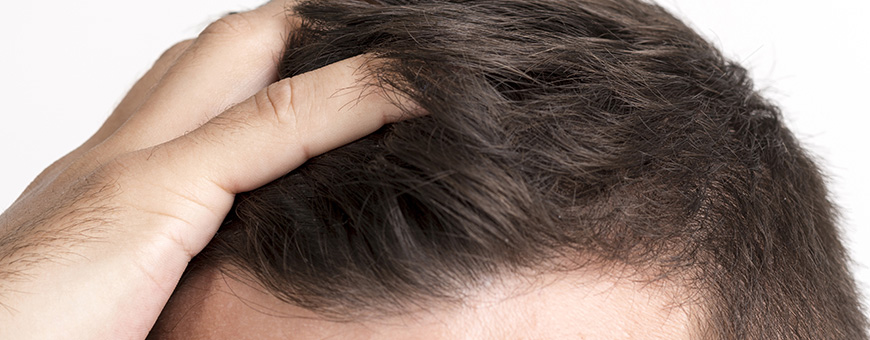What is folliculitis, and how to treat it
By Prof. Dr. Soner Tatlidede 2019-11-15

What is folliculitis? In general, when we talk about folliculitis we speak of an infection of the hair follicles that can be originated by viruses and bacteria, although some other factors like excessive sweating, rubbing with clothing, or a lack of hygiene, can also increase the risk of getting it. In men, it usually appears due to shaving; also, when folliculitis occurs in the head, although not usual, it may cause infections that are difficult to treat and can lead to baldness.
In fact many patients coming to Istanbul to get a hair transplant have lost their hair not because of genetic alopecia, but because of some diseases that lead to hair loss. And they choose Istanbul not only because of the hair transplant costs in Turkey -by the way, very affordable- but also because of the skilled and experienced medical teams in the country, like those you will find at Clinicana´s hair transplant centre in Acıbadem Taksim Hospital.
But now, let´s talk in detail about what causes folliculitis, what is exactly this disease, and how to get rid of folliculitis. We are sure you´ll find it very interesting and you´ll get all the answers you were looking for.
How do you know if you have folliculitis?
As we explained before, folliculitis is a skin infection that leads to inflammation of hair follicles. The most common cause is the continuous friction with the skin causing irritation, something that can occur in the neck, arms and legs, in the back or in the buttocks. Also, if folliculitis is caused by an obstruction of the hair follicle -due to the use of non-breathable clothing, excessive sweating or because of some creams- then it usually appears in armpits and groins.
Normally, the infection is caused by bacteria, viruses, fungi or parasites, although in most cases they the cause are Staphylococci that can be naturally found naturally in our skin. People with diabetes, dermatitis, leukaemia or HIV can be more vulnerable to get folliculitis, but it is also common among many men because of shaving, as well as in people who use hot tubs.
And what does folliculitis look like? Well, the most common symptoms are red bumps or white pimples; many people also wonder if folliculitis is itchy... and yes, irritation and itching are usual symptoms, as well as the presence of blisters with pus around the follicle, which also cause that infected hair easily falls off.
How to treat folliculitis
How to cure folliculitis is one of the most frequently asked questions. The answer will depend on each patient but also on the degree of infection. If the affected area is small and the patient didn´t have folliculitis before, the treatment can be as simple as using an antiseptic (chlorhexidine) or a topical antibiotic (mupirocin, clindamycin), especially when the cause of infection is clothing rubbing or excess of sweat.
Is folliculitis contagious? Yes, in many cases it can be a contagious disease. A clear example of this is the so-called hot tub folliculitis, which occurs when the water is not properly treated in showers, hot tubs, saunas, and so on. It's caused by certain types of bacteria that thrive in warm, wet areas; fortunately, it only generates mild infection cases that can be easily resolved with home treatments... and with an adequate chlorination of water, too.
However in severe cases of folliculitis, which occur when the infection is recurrent or covers a large area of the body, a specialist or a dermatologist must examine the case and provide the most appropriate treatment; this is very important because if the infection of the follicles is not treated in time, it can get worse and generate boils. In the worst cases of infection, taking systemic antibiotics may even be necessary.
How to get rid of scalp folliculitis
When folliculitis causes an inflammation in the scalp due to infection, then we call it folliculitis decalvans, which causes the destruction of the hair follicle and in the worst cases alopecia, which can affect not only the head but also the beard or other areas of the skin.
How long does folliculitis last? If the infection is moderate, scalp folliculitis can be cured in just a few days with antibiotic treatment. Although it is not a serious disease, it can decrease the patient's quality of life as well as affect his personal life and emotional well-being, since it causes not only discomfort because of itching but also unwanted aesthetic changes, and even visible scars.
If the infection is in the beard due to irritation generated by shaving, it may be enough to use shave creams that soften the follicle, as well as an antiseptic lotion (aftershave) to be applied after shaving. Doctor may also advise using creams, topical antibiotics or shampoos, which are very effective products to combat these types of infections in the scalp.
Can folliculitis be avoided?
As we mentioned before, factors such as sweating, friction, bumps or obstructions in the skin can trigger an infection of hair follicles; also, using medications such as steroids or certain antibiotics can produce folliculitis, as well as acne, or HIV. People with too oily or too dry skin may also be prone to have folliculitis.
The best prevention against this disease is avoiding wearing non-breathable, tight or chafing clothing, soften the beard before shaving, do not bathe if you have not enough guarantees that the water is clean and has been treated, and do not make hairstyles or other hair arrangements that may cause tractions in the hair or in the scalp. But above all this, the best you can do is to take care of your personal hygiene, since it is a skin disease.
With prevention and a proper treatment, this disease can be easily cured. However, in most severe cases as well as in folliculitis decalvans, it may be necessary to even perform cosmetic interventions, like a hair transplant. In any case, if you have any questions about what is folliculitis, what causes this infection and how to deal with it, please feel free to ask us any doubt or simply use our free online consultation service to get a proper diagnosis of your case.









